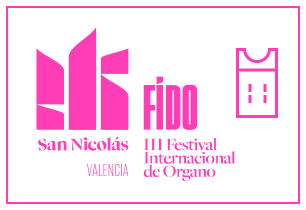The International Organ Festival (FIDO) celebrates its third edition this year to mark the 275th anniversary of the death of Johann Sebastian Bach.
This event, which has become a national benchmark in classical music, pays tribute to the great colossus of Baroque music, not only as a composer and organist but also as an admired improviser.
The organ at San Nicolás is one of only three surviving Baroque organs in the Valencian Community, adding incomparable heritage value to the event.
For this reason, the programme of this third edition, curated by Atsuko Takano, musical director and titular organist of the Parish of San Nicolás, includes a varied repertoire adapted to the unique sound of the parish organ.
The aim of this initiative is to promote and disseminate music across its various historical stages, making use of the organ both as a solo instrument and as an accompanist.
Because FIDO not only celebrates classical music, but also contributes to the preservation and promotion of Valencia’s cultural and artistic heritage, offering the perfect setting to combine art, culture, and musical excellence.
The festival will feature performances by prestigious international organists, including Philipp Christ (Germany), Jorge García (Spain), Fernando Pascual (Spain), Atsuko Takano (Japan), Ángel Montero (Spain), and Juan de la Rubia (Spain).
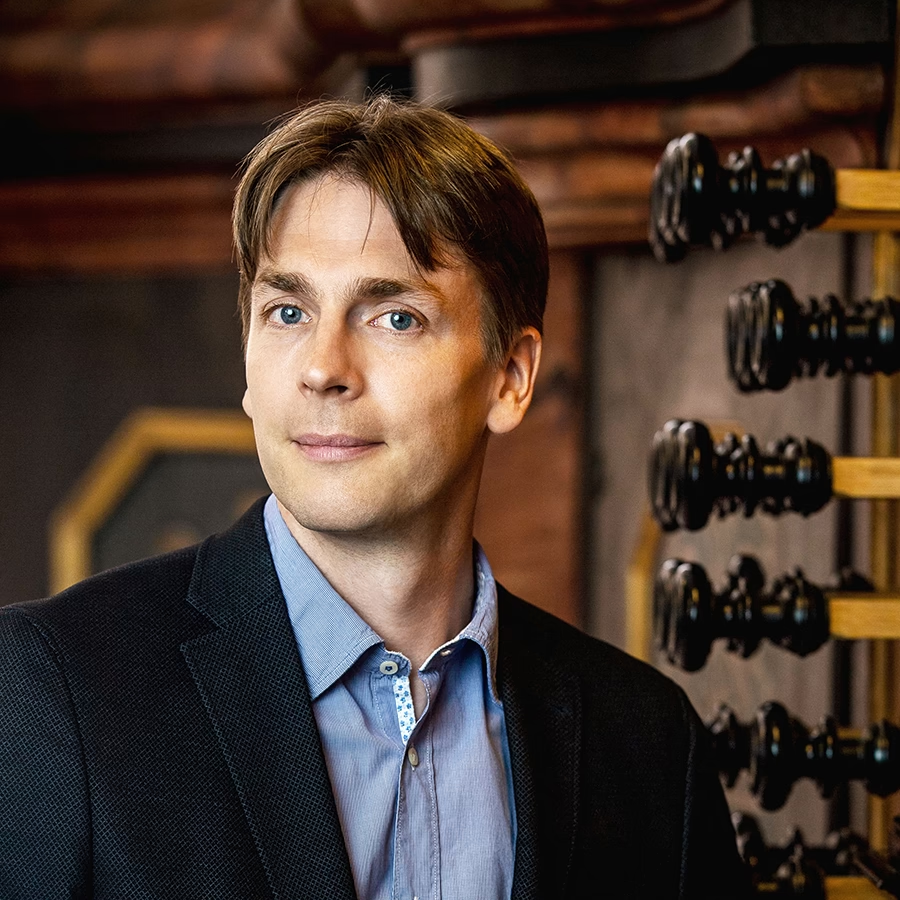
PROGRAM
PHILIPP CHRIST (Germany)
THURSDAY, MAY 8 / 8:00 PM
INFO
Thursday, May 8 at 8:00 PM
The program of German organist Philipp Christ at FIDO offers a musical journey spanning from the Baroque to the 20th century, with works of great expressive and technical richness.
The concert will begin with Mozart’s Fantasy in F minor, KV 608, presented in its piano version by Clementi, adding a new perspective to the drama and virtuosity of this piece originally written for mechanical organ.
Next comes a tribute to Bach with the Partita diverse sopra il Chorale, based on the chorale Sei gegrüßet, Jesu gütig. This piece consists of a chorale introduction and eleven variations.
The 20th century will be represented by Mozart Changes by Hungarian composer Gárdonyi, and the concert will close with God Save the King by German composer Heinrich Rinck, a piece reflecting the elegance of the Classical style.
PROGRAM
Wolfgang Amadeus MOZART (1756-1791)
Fantasia en fa menor, KV 608
(según la versión para piano de Muzio Clementi)
Johann Sebastian BACH(1685–1750)
Partita diverse sopra il Chorale “Sei gegrüßet, Jesu gütig” (Hail, kind Jesus), BWV 768 [Chorale and 11 variations]
Zsolt GÁRDONYI (*1946)
Mozart Changes
Christian Heinrich RINCK (1770 -1846)
Theme and Variations on “God Save the King”
Philipp Christ, Organ
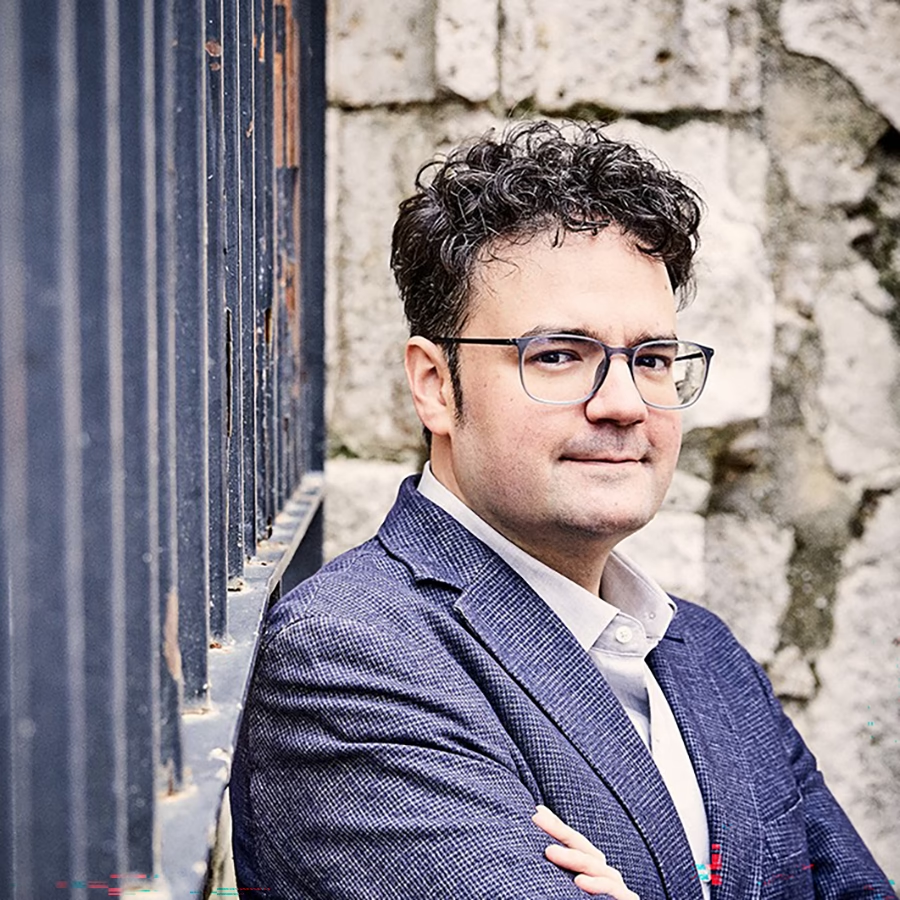
PROGRAM
THURSDAY, MAY 15 / 8:00 PM
JORGE GARCÍA(Spain)
INFO
Thursday, May 15 at 8:00 PM
The program of Spanish organist and harpsichordist Jorge García at FIDO fuses historical improvisation with masterpieces of Spanish and German repertoire.
The concert will open with a free improvisation on Tiento sobre passos by Cabanilles, pasacalles, and prelude and fugue. It will continue with Bach’s O Mensch, bewein dein Sünde groß, BWV 622, adding spiritual depth to the program. The final part will focus on three gems from the Spanish piano repertoire by Isaac Albéniz: Rumores de la Caleta, Granada, and Asturias, transcribed for organ, where Jorge García will showcase his sensitivity in recreating soundscapes ranging from Andalusian intimacy to the drama of northern Spain.
PROGRAM
Improvisation Tiento sobre passos by Cabanilles
Pasacalles
Prelude and Fugue
Johann Sebastian Bach (1685-1750)
O Mensch, bewein dein Sünde groß (BWV 622)
Isaac Albéniz (1860-1909)
Rumores de la Caleta (Recuerdos de viaje, Op.71)
Granada (Suite española Op.47)
Asturias (Suite española Op.47)
Jorge García Martín, organ
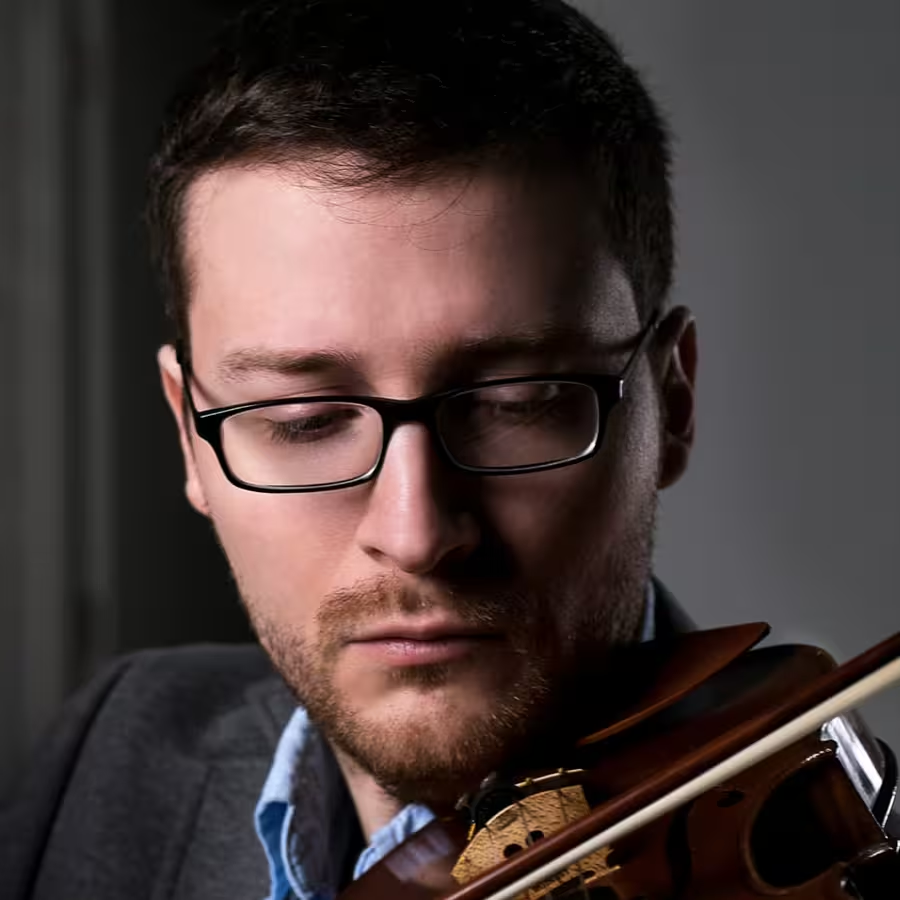
PROGRAM
THURSDAY, MAY 22 / 8:00 PM. FERNANDO PASCUAL & ATSUKO TAKANO
FERNANDO PASCUAL(Spain)
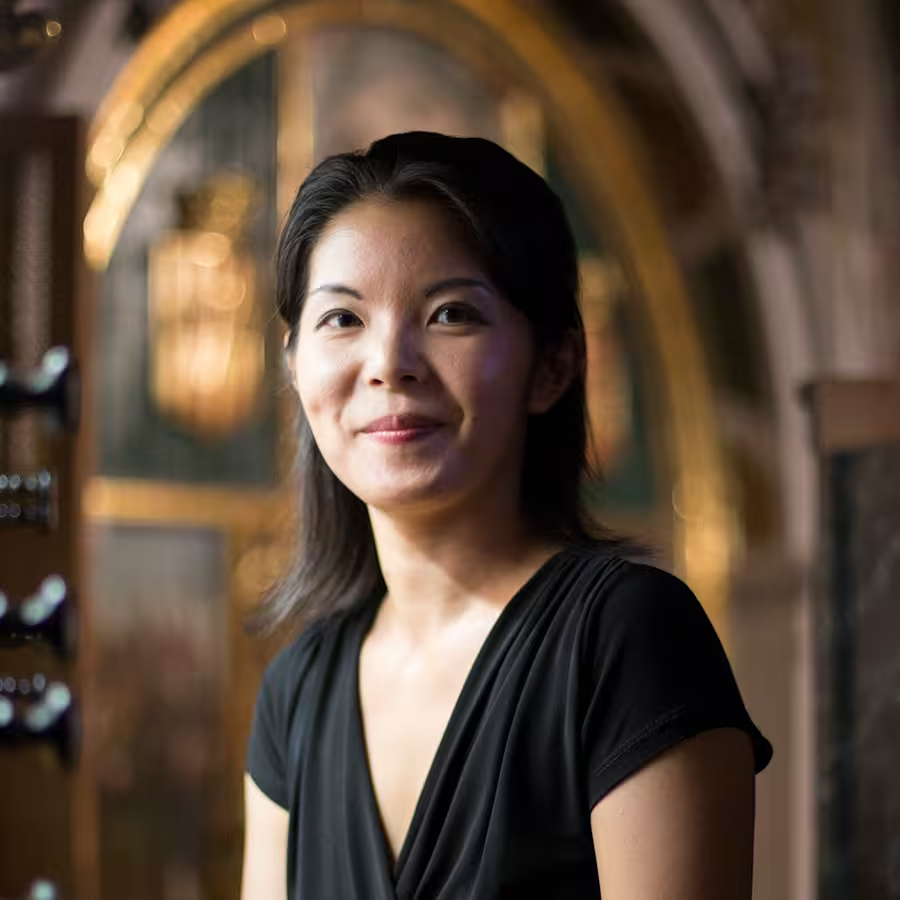
ATSUKO TAKANO(Japan)
INFO
The program by Japanese organist Atsuko Takano and Valencian violinist Fernando Pascual at FIDO 2025 is one of the most eagerly awaited recitals of the festival.
The program will open with the Phantasia quarti toni, a 16th-century anonymous work from the Danziger Tabulatur. It will continue with Bach’s Sonata for Violin in G Major, BWV 1021, where the balance between violin and organ reveals the richness of Baroque dialogue. Next is the Prelude and Fugue in E Major, BWV 566, one of Bach’s most virtuosic works for organ. The concert will culminate with Rheinberger’s Suite for Violin and Organ, Op. 166, a gem of German Romanticism.
PROGRAM
Fernando Pascual, violin
Atsuko Takano, organ
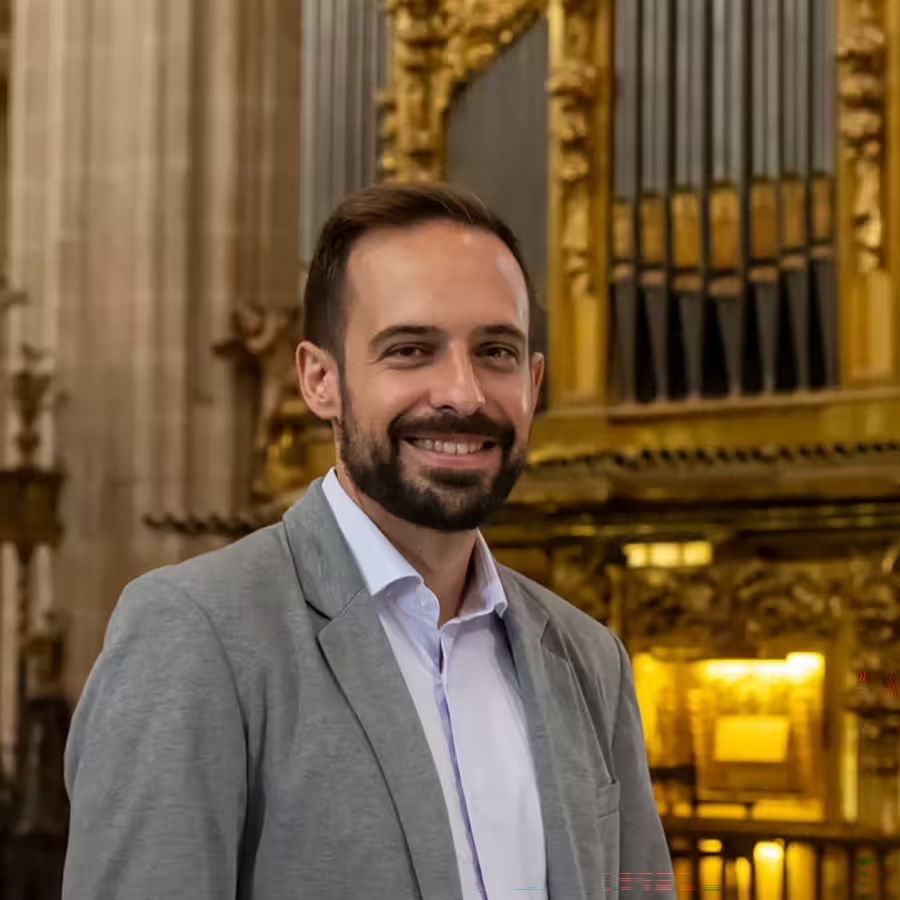
PROGRAM
THURSDAY, MAY 29 / 8:00 PM
ÁNGEL MONTERO(Spain)
Professor of Organ at the Arturo Soria Professional Conservatory of Music in Madrid and principal organist of Segovia Cathedral.
INFO
Thursday, May 29 at 8:00 PM
The program by Spanish organist Ángel Montero will offer a journey through the richness of organ repertoire.
From the composer, organist, and improviser Bach, he will perform three significant works: Praeludium et Fuga in G, BWV 541, Sonata BWV 527, and Schmücke dich, o liebe Seele, BWV 654.
The Spanish tradition will be represented by Eduardo Torres’s moving Saeta IV, and the concert will conclude with Mendelssohn’s Sonata in B-flat Major, Op. 65, No. 4, a work of Romantic power that closes the program with a majestic affirmation of the organ as a symphonic instrument.
PROGRAM
Johann Sebastian Bach (Eisenach, 1685 – Leipzig, 1750)
Praeludium et Fuga in G, BWV 541
Sonata 3, à 2 Clav. et Pedal, BWV 527
• Andante
• Adagio e dolce
• Vivace
Schmücke dich, o liebe Seele, BWV 654
Eduardo Torres (Albaida, 1872- Seville, 1934)
Saeta IV
Félix Mendelssohn-Bartholdy (Hamburg, 1809 – Leipzig, 1847)
Sonata in B-flat Major, Op. 65, No. 4
• Allegro con brio
• Andante religioso
• Allegretto
• Allegro maestoso
Ángel Montero Herrero, organ
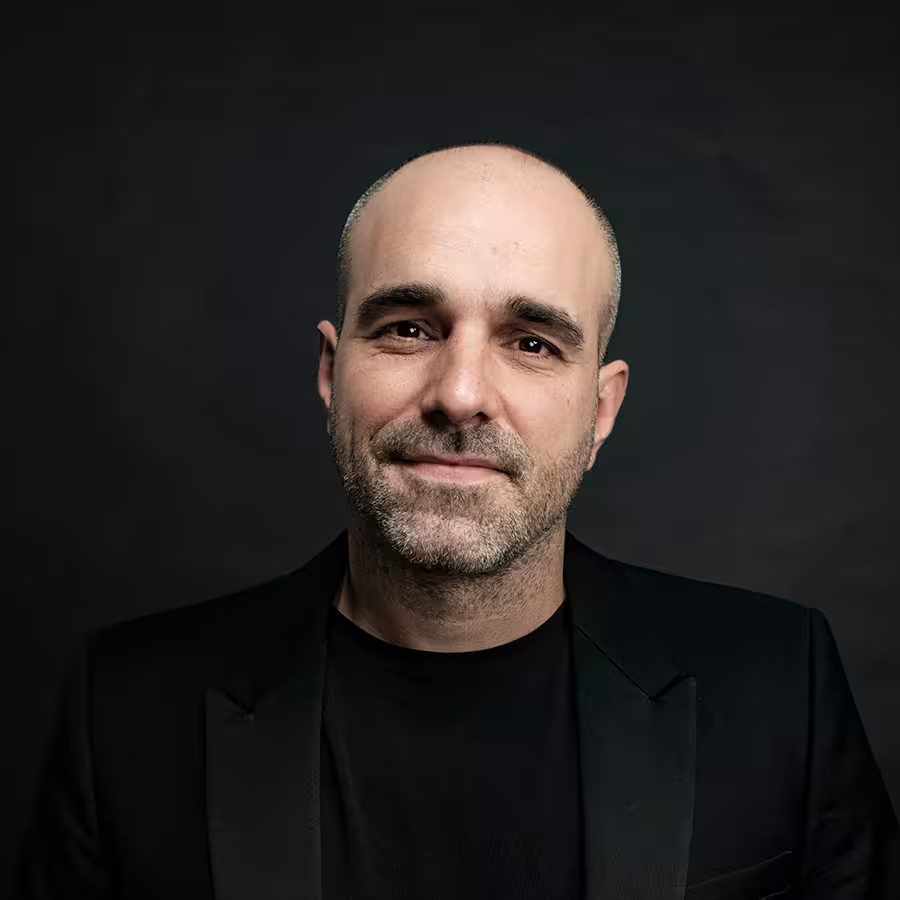
PROGRAM
FRIDAY, JUNE 6 / 8:00 PM
JUAN DE LA RUBIA(Spain)
INFO
Friday, June 7 at 8:00 PM
The program by Juan de la Rubia, principal organist of the Sagrada Familia Basilica in Barcelona, will close the FIDO festival, presenting a program spanning centuries of music from Cabezón, Caurroy, Ximénez, and Händel to Bach, Alain, and Glass.
A highlight is Bach’s Toccata, Adagio and Fugue in C Major, BWV 564, one of his most innovative organ works for its unusual structure and technical virtuosity. The opening toccata impresses with arpeggiated passages and expressive pedal use, the central adagio offers a lyrical moment with Italian influences, and the fugue culminates with energetic and balanced counterpoint mastery.
PROGRAM
A. de Cabezón (1510-1566)
Je vous…
E. du Caurroy (1549-1609)
Fantasy in four parts on “Une jeune fillette” (Tr. André Isoir)
J. Ximenez (1601-1672)
Batalla de sexto tono
J. Alain (1911-1940)
Variations on a theme by Clement Jannequin, JA 118
G. F. Händel (1685-1759)
Ouverture from Samson (Tr. J. de la Rubia)
J. Alain (1911-1940 )
Postlude pour l’office de Complies, JA 29
Ph. Glass (1937)
Mad Rush
J. S. Bach (1685-1750)
Toccata, adagio and fugue in C major, BWV 564
All proceeds from the concert series will be donated entirely to the organisations that form part of the San Nicolás Social Outreach Project, such as the Hogar de la Mare de Déu dels Desamparats i dels Innocents, Ciudad de la Esperanza, Colegio Nuestra Señora de los Desamparados, Proyecto Hombre, and Mamás en Acción.
In addition, the festival will include a “fila 0” (supporters’ row) for those who wish to contribute to the Parish without attending the event.
BIOGRAPHIES
PHILIPP CHRIST
Between 2000 and 2008, he studied piano, sacred music, and organ at the Musikhochschule in Lübeck under professors Hartmut Rohmeyer and Arvid Gast. In 2003, he furthered his studies at the Conservatorium van Amsterdam with Jacques Van Oortmerssen, and in 2011 he completed the prestigious Konzertexamen in Hamburg with distinction, studying with Wolfgang Zerer.
His artistic development has been enriched by masterclasses with renowned organists such as Harald Vogel, Edoardo Bellotti, Michael Radulescu, Ton Koopman, Naji Hakim, and Bill Porter.
Christ has also been awarded prizes at various international competitions. In 2006, he won first prize at the Orgelconcours in Leiden; in 2007, he received the Förderpreis at the Buxtehude Competition in Lübeck; and in 2008, he was awarded third prize at the Kazan International Organ Competition.
Between 2007 and 2009, he served as assistant organist on the three historic organs at St. Jakobi Church in Lübeck. Since 2010, he has been the principal organist at the Hauptkirche and Kreuzkirche in Suhl, Thuringia, where he is responsible for the Eilert-Köhler baroque organ, built between 1738 and 1740.
As a concert artist, he has performed recitals in Germany, England, Italy, France, Poland, Estonia, Russia, Japan, and the United States, gaining recognition for the depth and sensitivity of his interpretations, especially in the classical and baroque organ repertoire.
JORGE GARCÍA MARTÍN
He began his studies in Salamanca, where he trained in piano, organ, and harpsichord. He later completed a master’s degree in organ performance, studying with teachers such as Lorenzo Ghielmi, Andrea Marcon, Wolfgang Zerer, and Jörg-Andreas Boetticher, and specialized in historical improvisation with Rudolf Lutz, Markus Schwenkreis, Nicola Cumer, and Emmanuel Le Divellec.
He has been awarded prizes in international organ competitions, and his recordings of Spanish early keyboard music are now considered a benchmark, valued by both specialized critics and the academic world.
He has taught as an assistant professor of Historical Improvisation at the Schola Cantorum Basiliensis and has taught Improvisation and Basso Continuo at the Katarina Gurska Higher School of Music. He is currently a professor at the Castilla y León Higher Conservatory of Music (COSCYL) and is developing new pedagogical methodologies for teaching basso continuo and improvisation, which he also applies at the International Organ Academy in Castilla and as a guest teacher at European institutions
Additionally, he offers recitals as an organist and harpsichordist across Europe, America, and Asia, focusing his repertoire on historical performance and improvisation. He also collaborates with institutions such as the Lausanne Improvisation Festival, Basilea Studientage Improvisation, the Hispanic Organ Institute, the Fray Joseph de Echevarría Organ Academy, National Heritage, and various musicological societies.
Finally, he is currently completing a doctoral dissertation at the University of Valladolid on Spanish keyboard improvisation during the 18th century.
FERNANDO PASCUAL
He has been awarded first prize at the national competitions of L’Alcora and Villena, as well as at the international Jugend Musiziert competition (Germany, 2004). As a soloist, he has performed at prestigious festivals such as those of Santander, Torreblanca, and the “Juan de Borbón” International Festival in Segovia, and has collaborated with various orchestras and chamber ensembles.
Between 2010 and 2017, he regularly worked with the Orquestra de Valencia, gaining extensive experience as an orchestral musician in symphonic and operatic repertoire. He has participated in recordings for Brilliant Classics and Aria Classics, consolidating a discographic presence that reflects the breadth of his repertoire and interpretative sensitivity.
Parallel to his musical career, Pascual has developed a solid academic background. He holds a degree in German Philology from the University of Valencia, a Master’s in Music from the Polytechnic University of Valencia, and a PhD in Humanities and Arts from the University of Castilla-La Mancha, thus combining his artistic profile with a profound humanistic foundation.
Since 2021, he has been Professor of Violin at the “Salvador Seguí” Higher Conservatory of Music in Castellón, where he combines teaching with artistic and research activities.
ATSUKO TAKANO
She later continued her organ studies at the Conservatorium van Amsterdam with Jacques van Oortmerssen, earning a Master’s degree cum laude with a final recital on the famous C. Müller organ at St. Bavo Church in Haarlem.
Awarded the “Huygens” scholarship by the Dutch Ministry of Education, she has won prizes in major international competitions such as the “Arp Schnitger” Competition in Germany and the “Westfield International Competition” in New York. Her concert activities have taken her across Europe, the United States, and Japan, performing as a soloist and accompanist, and participating in various recordings for Dutch and German public radio as well as in important orchestral projects.
In 2016, she debuted as a soloist with the RTVE Orchestra and Choir performing Franz Schmidt’s The Book with Seven Seals, a collaboration she has continued in numerous subsequent concerts, including the annual tribute to terrorism victims at the National Auditorium and choral programs at El Escorial Monastery.
Since 2017, she has been Music Director and Principal Organist at San Nicolás Church in Valencia, known as the “Valencian Sistine Chapel.” In 2023, she was appointed professor of repertoire in the Early Music Department at the “Salvador Seguí” Higher Conservatory of Music in Castellón.
ÁNGEL MONTERO
He has performed concerts throughout Spain, as well as in Germany, Portugal, Italy, Switzerland, France, and Morocco.
He completed his advanced organ studies in Madrid (Katarina Gurska Higher Center, 2012–2016) with Professor Roberto Fresco, graduating with top honors, and pursued a Master’s degree in Organ Performance in Munich (Hochschule für Musik und Theater München, 2016–2018) with Professor Bernhard Haas. He has expanded his training through various courses and masterclasses in Spain, the Netherlands, Germany, and Denmark, with prominent international teachers.
He is a First Prize winner of the 4th National Young Performers Competition “Iohannes Baptista Cabanilles” (Algemesí, 2017) and the Andrés Segovia – José Miguel Ruiz Morales Prize (2010) at the “Música en Compostela” festival.
He is president of the “Correa de Arauxo” Association of Friends of the Organ of Segovia and coordinator of the International Organ Course at the MUSEG Festival in Segovia. Additionally, he carries out outreach activities for the instrument and its repertoire within other institutions in Castilla y León and Madrid dedicated to these purposes.
JUAN DE LA RUBIA
Awarded top academic honors upon completing his studies, his career was launched by important distinctions such as first prize at the Juventudes Musicales de España Permanent Competition and the Primer Palau competition, milestones that marked the start of his artistic rise.
His concert activity has taken him to over thirty countries, performing as a soloist in prestigious international venues. He has also collaborated as soloist and conductor with orchestras such as the Spanish National Orchestra, RTVE Orchestra, ORCAM, and the symphony orchestras of Galicia, Bilbao, Castilla y León, Asturias, and the Bogotá Philharmonic, among others.
Committed to historically informed performance, he has worked with Les Siècles and conducted ensembles such as the Freiburger Barockorchester and the Tenerife Baroque Orchestra. In 2023, he founded his own ensemble, the Orquestra del Miracle, which was excellently received by both critics and the public in its inaugural concert.
He has also shared the stage with renowned soloists such as Matthias Goerne, Carolyn Sampson, Elena Obraztsova, Marta Mathéu, and Philippe Jaroussky, with whom he recorded the album Sacred Cantatas (Erato, 2016), nominated for the Grammy Awards.
In recent years, he has also developed innovative projects such as Bach&Forward, alongside pianist Marco Mezquida, focusing on contemporary improvisation based on the baroque language.

